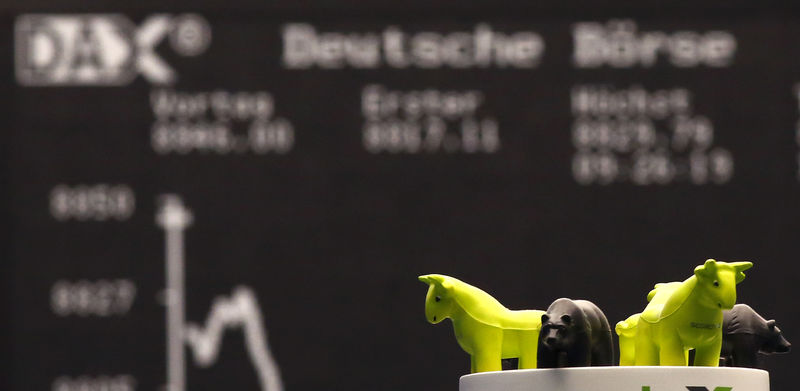By Peter Nurse
Investing.com - European stock markets are expected to open sharply lower while crude prices soar to multi-year highs on fears that Western powers will ban Russian oil exports, potentially triggering a major inflationary shock for the global economy.
At 2:10 AM ET (0710 GMT), the DAX futures contract in Germany traded 2.9% lower, CAC 40 futures in France dropped 2.3% and the FTSE 100 futures contract in the U.K. fell 1.8%.
This follows comments from U.S. Secretary of State Antony Blinken, who said on Sunday that the Biden administration was in “very active discussions” with European governments about banning imports of Russian crude and natural gas.
Oil prices, already elevated after Russia’s invasion of Ukraine more than a week ago, climbed to levels last seen in July 2008 as the market adjusted to the potential of Russia’s supply no longer being available.
Russia is the world's top exporter of crude and oil products combined, with exports at around 7 million barrels per day, or 7% of global supply.
By 2:10 AM ET, U.S. crude futures traded 8% higher at $124.92 a barrel, while the Brent contract rose 8.6% to $128.30.
Oil prices posted their largest weekly gains since mid-2020 last week, with the Brent benchmark up 21% and U.S. crude gaining 26%.
This sharp rise has raised concerns about the impact on global economic growth and inflation, particularly with many of the world’s major central banks looking to raise interest rates to cope with soaring consumer prices.
“I suspect growth projections for 2022 around the world will need to be sharply revised lower, and it will be interesting to see what the central banks of the world will do,” said Jeffrey Halley, Senior Market Analyst for Asia Pacific and OANDA. “I believe Europe and Asia will halt thoughts of monetary policy normalization.”
The European Central Bank meets later this week, and these surging commodity prices complicate the central bank’s policy picture.
The ECB is expected on Thursday to stick to its plans to end asset purchases under its Pandemic Emergency Purchase Program, while doubling asset buying under its longer running Asset Purchase Program in the second quarter.
Providing a modicum of comfort, German retail sales climbed 2% on the month in January, up 10.3% on the year, while German factory orders rose 1.8% in January.
Additionally, gold futures rose 1% to $1,986.90/oz, while EUR/USD traded 0.4% lower at 1.0888.
